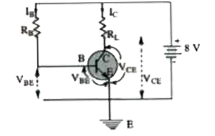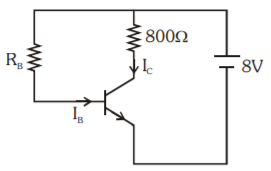An n-p-n transistor in a common-emitter mode is used as a simple voltage-amplifier with a collector current of 4 mA. The terminals of a 8 V battery is connected to the collector through a load-resistance RL and to the base through a resistance RB. The collector-emitter voltage VCE=4V, the base-emitter voltage VBE=0.6V and the current amplification factor βdc=100. Then
Potential difference across RL

=8V−VCE=8V−4V=4V. Now ICRL=4V
RL=44×10−3=103Ω=1kΩ
Further for base emitter equation, VCC=IBRB+VBE
or IBRB= Potential difference across RB
=VCC−VBE=8−0.6=7.4V
Again, IB=ICβ=4×10−3100=4×10−5A
∴RB=7.44×10−5=1.85×105Ω=185kΩ
Topper's Solved these Questions
- SEMICONDUCTOR DEVICESBOOK - AAKASH SERIESCHAPTER - SEMICONDUCTOR DEVICESEXERCISE - EXERCISE - IA
54 Videos
- SEMICONDUCTOR DEVICESBOOK - AAKASH SERIESCHAPTER - SEMICONDUCTOR DEVICESEXERCISE - EXERCISE - IB
7 Videos
- SEMICONDUCTOR DEVICESBOOK - AAKASH SERIESCHAPTER - SEMICONDUCTOR DEVICESEXERCISE - PRACTICE EXERCISE (LOGIC GATES )
15 Videos
- RAY OPTICSBOOK - AAKASH SERIESCHAPTER - RAY OPTICSEXERCISE - PROBLEMS ( LEVEL-II)
60 Videos
- UNITS AND MEASUREMENTBOOK - AAKASH SERIESCHAPTER - UNITS AND MEASUREMENTEXERCISE - PRACTICE EXERCISE
45 Videos
Similar Questions
An n-p-n transistor in a common - emitter mode is used as a simple voltage amplifier with a collector current of 4 mA. The positive terminal of a 8 V battery is connected to the collector through a load resistance RL and to the base through a resistance RB . The collector - emitter voltage VCE=4V , the base - emitter voltage VBE=0.6V and the current amplification factor β=100 . Calculate the values of RL and RB .
View SolutionA npn transistor is connectedin CEC in which collector voltage drop across load resistance (800 ohm) connected to collector circuit is 0.8V The collector current is

View Solution
Knowledge Check
A transistor connected in common emitter mode, the voltage drop across the collector is 2 V and β is 50, the base current if RC is 2kΩ is
A40μAB20μAC30μAD15μAThe power gain for common base amplifier is 800 and the voltage amplification factor is 840. The collector current when base current is 1.2 mA is
A24 mAB12 mAC6 mAD3 mAFor a common emitter transistor amplifier, the audio signal voltage across the collector resistance of 2kΩ is 2 V. Suppose the current amplification factor of the transistor is 100, the base current if base resistance is 1kΩ is
A10μAB20μAC5μAD2μA
In a common base mode of a transition , the collector current is 5.488mA for an emitter currect of 5.60mA . The value of the base current amplification factor (β) will be
View SolutionFor a transistor working as common base amplifier, the emitter current is 0.72 mA. The. Current gain is 0.96. The collector current is
View SolutionA transistor is used in Common-emitter mode in an amplifier circuits. When a signal of 20 mV is added to the base-emitter voltage, the base current changes by 40μA and the collector current changes by 2mA. The load resistance is 5kΩ then the voltage gain is
View SolutionA transistor has α=0.90, the emitter current is 15mA, what is
(a) The collector current ?
(b) The base current ?
(c) Gain β ?
View SolutionA transistor has a current amplification factor (current gain) of 50. In a common emitter amplifier circuit, the collector resistance is chosen as 5Ω and the input resistance is 1Ω. The output voltage if input voltage is 0.01 V is
View Solution
